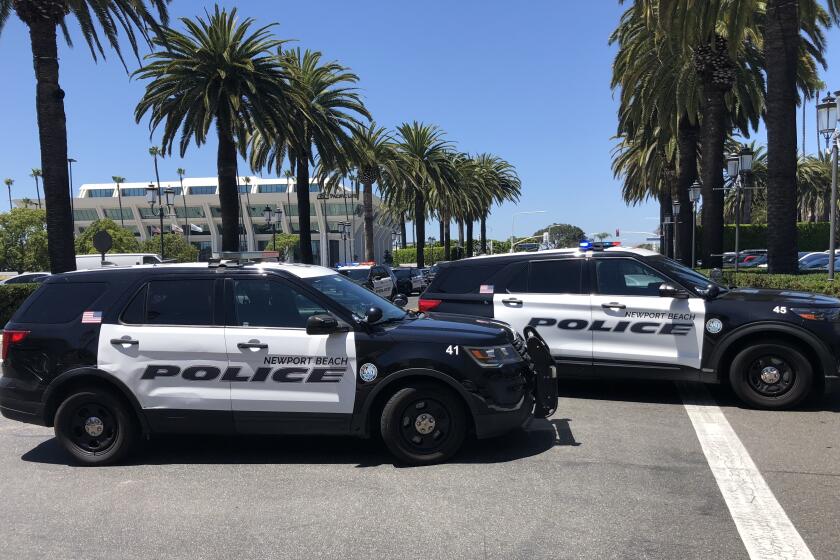A valuable life lesson is learning to put the world first
- Share via
CHERRIL DOTY
“So, it comes first: the world. Then, literature. And then, what one
pencil moving over a thousand miles of paper can (perhaps, sometimes)
do.”
-- MARY OLIVER, Blue Pastures
“What can I do to help?”
Many of us want to do what we can to make the world a better place
to live. We just don’t know what to do, or we become overwhelmed by
the size of the task. Knowledge is definitely the key. My hope in
writing this is that I can prod each of you down the path of that
knowledge, that we may all put the world first. With better
understanding, it is hoped that we can all see how life is all
interrelated and how we can better protect our vulnerable planet.
In North America, no other region comparable in size to California
has as great a diversity of natural beauty, flora and fauna. Because
of California’s many unique habitats, 40% of its animals are found
nowhere else in the world. Some of this plethora of natural life can
be found right here along our own Laguna Beach shoreline.
Life in the sea is an extravagant abundance of variety, antiquity,
oddity and beauty, and it is rapidly diminishing. The sea is filled
with wonderful examples of leftover life -- living fossils still
flourishing long after the evolutionary process has passed them by.
Our tide pools are home to a wide variety of invertebrates. These
creatures without backbones make up the majority of animal life-forms
in water as well as in air and on land. In our tide pools, some
cling, some dig, some swim and some scuttle as they struggle to
survive the impact of nature and man.
Marine mammals like the sea lion, brown pelicans, shorebirds,
gulls, kelp, sea urchins, anemones, starfish and myriad other
invertebrates call our beaches home. This is their habitat as well as
ours. They and the plant community that sustains the smallest of them
are dependent upon one another -- directly or indirectly -- for
survival. And they are all dependent on us for protection of their
environment. If deficiencies in any of the forms of life become too
great, the entire ecosystem can collapse.
What can each of us do to help?
Learn all you can about keeping our water clean. Start in your own
backyard, and then tell others. I am always amazed at how many
inlanders don’t realize their water runoff drains to the sea. You can
educate others through small reminders like these.
Learn the posted tide-pooler rules:
* Never remove animals, shells or rocks from tide pools.
* Never pick up animals; observe them where they are. (Take a
picture. The colors will last longer and the pictures can be passed
around and shared.)
* Don’t pull animals off the rocks or poke them with sticks.
* Walk gently, taking care not to step on plants or animals.
* Never turn over rocks.
Pass these rules on to others. If you see someone taking creatures
or shells, simply let them know there is a very stiff fine in Laguna.
Become a Tidewater Docent, and give a few hours of your time to
educating along the beach.
Learn the names of the many plants and animals -- the starfish,
barnacles, crab varieties, rough limpets, snails, anemones, the sea
urchin, sea lettuce, algae, sanderlings, gulls and more. It’s funny
how knowing their names brings us closer to them.
There is no other watery planet like ours in the solar system. We
are blessed to live here at the edge of the sea that shapes the
world’s surface, moderates its climate and is home to a vast array of
plant and animal life. The health of the ocean is essential to the
survival of all life on this planet. You and I are in unique
positions to make a difference.
And if you are looking for a fun way to get started on your
education -- or someone else’s -- come on out to the Sawdust Festival
and visit Jan Sattler’s booth while enjoying the art and music. She
and her husband, Fred, are strong advocates for our tide pools and
wonderful sources of information.
Or, this Saturday is beach cleanup day locally. Join the Clean
Water Now! Coalition and the Surfrider Foundation to pick up trash
(and there’s plenty of it!). Meet at Main Beach between 8:30 and 9
a.m. for cleanup of our beaches from 9 a.m. to noon.
* CHERRIL DOTY is a creative living coach, writer, artist and
walker who lives and works in Laguna Beach and believes in amazing
and remarkable things and continuous learning. To schedule a coaching
session or to comment, contact her by e-mail at emmagine@cox.net or
by phone at (949) 251-3993.
All the latest on Orange County from Orange County.
Get our free TimesOC newsletter.
You may occasionally receive promotional content from the Daily Pilot.



